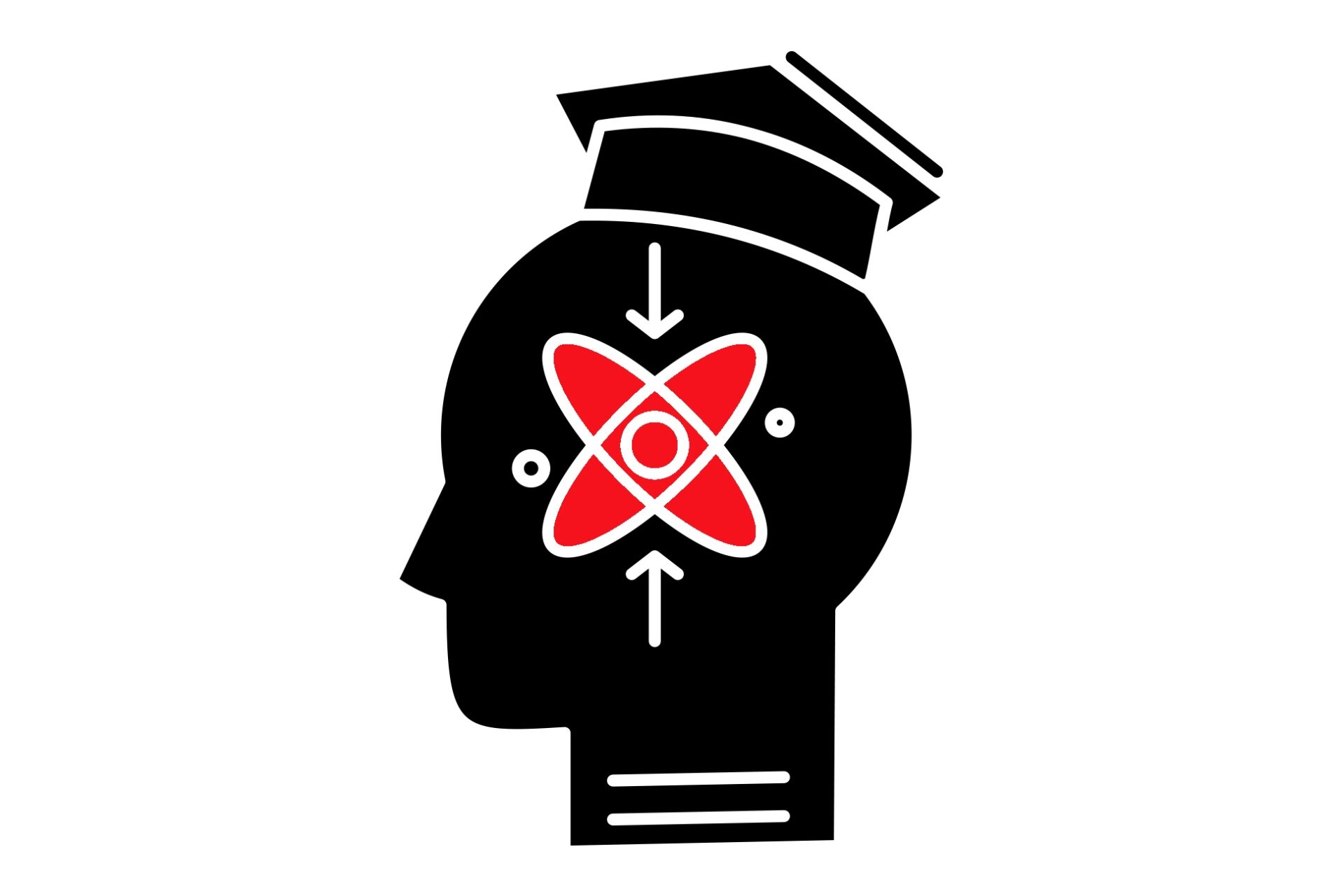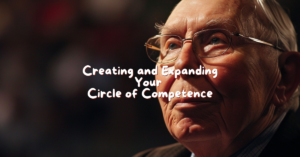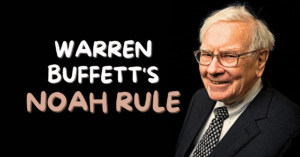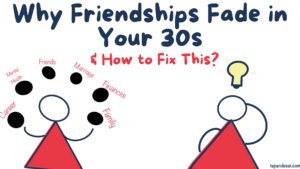Colleges are for fun but not for learning.
Elon Musk
I have been thinking about this for some time and some of the most important life skills are never taught in school. If they are taught, they are not taught correctly.
Yes – our schools do teach us how the Pythagoras theorem works and that the Mitochondria is the powerhouse of the cell which are pretty key things to learn in life but hear me out, we are not actually ‘taught’ the fundamental life skills that are required to navigate our day-to-day life. Skills that we use daily.
The current education system is broken (not talking about the student debt, that’s a separate rant). But the current schooling system is for the masses. Anything that is for the masses will just make you average. If you’re taught standard courses that do not amplify your own abilities, you will fall behind.
So let’s discuss some of these life skills that we are not taught and see if we can learn something new today. I am talking about skills like reading, writing, note-taking, organizing, and understanding.
I wanted to share some lessons that I have learned over the years chasing productivity. Some of these techniques I have read, some of these techniques I have implemented and they have worked.
This is not an in-depth post on all these topics by any means but some quick wins that you could try and see if they help you.
📚 READING AND KNOWLEDGE CONSUMPTION
CASE
Honestly, we were taught how to read when we were in kindergarten. Remember? Your teacher picking you up and you have to read loudly in front of the whole class? But is it the right way to read?
Also, were we even taught how to consume different forms of media other than books? Now we have podcasts, videos, audio-books, Kindle, and so many other mediums to consume knowledge.
I will focus more on books but provide some pointers for other mediums.
The problem is that most of us learn to read books for school. And school conditions us to assume that we should be able to actively recall most things we read. We shouldn’t. Human memory doesn’t work that way. We just did that to make decent grades on the tests we took. But this is not real life. You’re not being quizzed on any material. And if you do forget something, you can always walk over to the shelf, pick the book up and read the relevant sections again. Nobody is going to penalize you for forgetting. So, in that sense, you don’t actually need to remember all the information in each book, you simply need to remember what information is in each book. All the stuff I write in these newsletters and on my website, I don’t remember it, I just remember where I saw it. And then I go pick the book up, flip to the appropriate chapter, refresh my memory, and write it down again. Voila. I “remember” shit.
Mark Manson
Consuming knowledge is about understanding and noting it down for recall. More on that below.
WHAT CAN YOU DO?
- Find different mediums that you enjoy to consume knowledge; it could be physical books, audiobooks, podcasts, blogs, newsletters, and so on. Make it easy for you to switch between the different mediums. I like reading physical books in the morning but at night, Kindle is easier for me (to take notes and highlights). Consuming knowledge is important, the medium does not matter.
- Before you start reading, you need to know what you are planning to achieve from the text (be it a book, article, or a thread on Twitter). If you’re not getting what you wanted from the text, it’s okay to skim and skip. But at the same time, keep an eye out for something that might interest you that you hadn’t planned.
- Let’s take an example of a self-help book that wants you to wake up early every morning. Since the author has to fill in 300 pages of text, they will explain their personal journey, why is it beneficial, case studies, how to do it, and other nonsense. Now, most people will only be interested in why and how to wake up early? Some might enjoy the personal stories or case studies. So before you pick up the book, think about what you want and focus on those parts. You can skim the remaining book.
- When you pick up a book, go through the index in detail. This will help you narrow down on text that you actually care about. It creates a mind-map for the book or article. I have already read that some people skim through the entire book before they start to read. I don’t do that but if you think it might help you focus better, do it!
- Once you know what you want out of the text, just go to that piece and read it. Again, feel free to skim through the remaining parts. As Mark said above, no one is going to quiz you about it. Till the time you’re getting what you wanted from the book, it’s okay.
- Quantity never matters (says the guy with a Reading Challenge). Quality trumps quantity; make sure you’re taking detailed literature notes of whatever you’re reading. No one remembers everything that they have read.
- The thing that sets you apart from the average reader is how you document your lessons from the text that you have read so you can recall them whenever.
- The only important piece is to be able to link the things you have read (more details below) and be able to search where you had read them.
- I want to read more but books are not interesting? If you think books are not for you, you haven’t found the right book.
- Reflect on the movies/TV Shows you watch regularly. What are the genres? Pick books from those genres.
- I used to watch a lot of historical documentaries even though I abhorred history in school. Some of my favorite books currently are history-based.
- Pick books from genres that you currently consume. No need to chase the NYT Recommended books or what your friends like. Pick your own books.
- You don’t have to read the words out loud or repeat them in your head when reading. One of the wrong things that we are taught in school is to read loudly. This reduces our reading speed significantly. It’s a bad habit that we all have acquired because of the schooling system.
- Press your tongue to the roof of your mouth initially to reduce repetition in your head. Your reading speed will increase significantly. Our brains are powerful enough to capture the text we see without us repeating the words out aloud. Try it!
- If you sleep often while reading or get lost in thoughts, use a pointer. It could be a pen or your finger and move it as you’re reading.
- If you are consuming knowledge through audio or video format, use 1.5x or 2x speed. You will go through the content significantly quickly.
- If you are reading or watching something for fun, ignore everything I just said.
I NEED MORE DETAILS
How to Read More Books on my blog.
Yes, I have read a book on how to read books. How to Read a Book by Charles Van Doren has a lot of details on how to read properly.
Tim Ferriss explaining how to speed read. If you don’t comprehend while speed reading, avoid it but there are some useful tips in this video.
✍WRITING
CASE
Writing is a skill I picked up recently. My dad always told me to write things while I was studying in school. I completely ignored this advice. I mean who can write when studying lying flat on the bed with the book on top of their face?
However, I have now learned that writing is one of the most important skills. Writing concisely helps you think better.
I always thought writing is to memorise. However, when you write you will find gaps in your understanding of things you have read or things you know.
WHAT CAN YOU DO?
- When you’re reading or watching something interesting, open a note-taking app (I prefer Notion) and start typing. It’s crucial to write lessons in your own words.
- Yes – it’s essential to write lessons learned in your own words instead of just copy-pasting the quotes.
- For the longest time, I made this mistake. I had this huge collection of quotes from all the books I had read but I didn’t remember them neither did I use them anywhere. When you write quotes in your own words, you understand the meaning better.
- Write for yourself, you don’t have to publish. You’re writing to think critically or reflect better.
- Write in simple words. Don’t use big words for the sake of it. The simpler the words, the better is your grasp of the topic. If you understand a topic, you will be able to teach it to a 5-year-old kid.
- How do I write well? As James Clear mentioned in one of his newsletters, the trick to writing well is 1) taking long sentences and making them short 2) taking confusing ideas and making them clear 3) taking unrelated concepts and making them related…without losing the main idea in the process.
- All the articles, Twitter threads, Reddit posts, Insta posts you read online are essentially doing this. Even this post.
- What do I write about? Lessons learned from books, videos, podcasts. Reflection on your day in a journal. Any random thoughts or ideas. Again, the idea is to write to think or reflect better. If you think you want to publish your writing, do that.
- Learn how to tell a story through your writing, focus on the journey. Why did you start, what were the lessons learned, challenges faced. You can do this in your daily journal, Instagram caption, Twitter threads, blog articles.
- Make your writing personal. Tell personal stories and share your journey. Write as if you would talk to someone. Again, we are taught formal writing in school. You don’t have to do that when you’re publishing online.
- If you’re writing an online article, never start with the introduction. You will face writer’s block. Create an outline of the meat of the content, fill that out, and then go write the introduction.
- Start journaling! When you journal every day, you can reflect on your day and practice your writing skills. Bonus – at month-end, you can reflect on your month and remember your journey better.
I NEED MORE DETAILS
21 Tactics to Help You Become a Better Writer by Nat Eliason
Writing Briefly by Paul Graham
The Ultimate Guide to Writing Online by David Perell
10 Step Guide to Clearer Thinking Through Writing by Jordan Peterson
The Feynman Technique to Learning by Writing:
📂ORGANIZING
CASE
It’s baffling to me how unorganized some people are with their personal life. At work, they will have binders and binders of project plans. They use Trello, Excel, MS Projects, and whatnot. But nothing for their personal life!
Get your life in order.
Stop pretending. We all know no one remembers everything. Your brain is for generating ideas, not for storing them.
WHAT CAN YOU DO?
- Make a central inventory for all your tasks. Use a note-taking tool (Apple Notes, Notion, Google Notes, EverNote) to make lists of things you want to do, anything you remember, tasks. Put all of them in one place! Build a system that you can trust and keep it simple. Once you trust the system and realize all your tasks in one location, you will have a lot more mental capacity.
- Make this list in advance. Build a system to go through your to-do list every day.
- Start simple. Once you get a hold of noting down things, start categorizing tasks.
- Notion is a really amazing tool to do that! This what my Notion task database looks like. I am using Thomas Frank’s Notion Template (it’s free). All new tasks go in the inbox and at the end of the day, I assign a project and a due date. I am still new to this system and switched recently so still getting used to it. I used EverNote before.
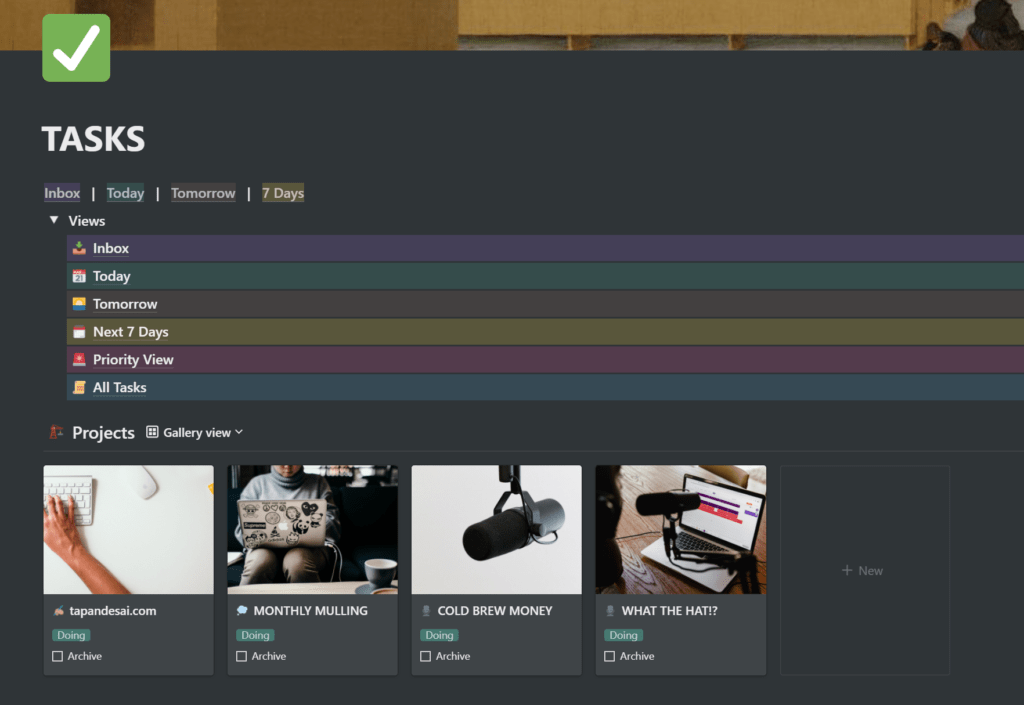
- Don’t just make a list, add details. Write down when will you do it, how much time it will take, and break it into sub-tasks. If you don’t have a plan on how to deal with it, you won’t deal with it until it becomes a big problem.
- Google Calendar is a powerful tool. Use it. Schedule time on your calendar for things you want to achieve in the day. You can literally set a time when you’re creating your to-do list. This will keep you more organized and you can take a look at all your to-dos in one location.
- As David Allen puts it in Getting Things Done, if it takes less than 2 minutes to do, just do it. If the task you intend to do takes less than 2-minutes, don’t write it down.
- Create a second brain using an organization tool (Notion, Roam, Evernote). Store your ideas, notes, lessons here in one single location. A second brain is an external storage system that maps your tasks, ideas into one place, so you don’t have to worry about losing them. (More details coming soon ?)
- Use Chrome bookmarks, mobile notes, audio notes to capture your thoughts and content you’re consuming. At the end of the day, bring them into the central repository – your second brain. The important task is capturing whatever you stumble upon online or you’ll forget!
- If you’re repeating a task manually, find a way to automate it. If you can’t automate it, batch it.
- I spent a ridiculous amount of time sweeping every weekend and wasn’t getting time to work on my projects. So I recently bought a robot vacuum during the Black Friday sale. Laundry, dusting, groceries are batched together on Sunday mornings.
I NEED MORE DETAILS
Mastering Time Management on my blog.
David Allen’s Getting Things Done is productivity and organization Bible. This book will help you with your personal and work life.
📝NOTE TAKING
CASE
I used to be a book-purist. No notes inside my books. But I realized, I wasn’t able to remember everything. As I said in the ‘Reading’ section, no one does. So you need to capture notes.
The idea behind taking notes is to have a reference to all the fundamental details that you need to remember the underlying idea or at least refer to the source.
You can also take notes to write your personal ideas. Creativity can hit you anywhere anytime. It’s important to have a system to capture those creative ideas. As it is said, inspiration doesn’t come to people who wait. It comes to those who do something consistently.
In 2018, I started capturing notes in Evernote – for books, podcasts, videos, newsletters, articles, and so on. However, in 2019, I realized my notes were not organized. So I started categorizing them.
In 2020 I realized, I was just capturing notes but not generating ideas from them. For me, the end-goal is to generate ideas and publish content. So the notes need to link with each other. I now have a new technique (more details coming soon ?). I have slowly started building my second-brain using Notion and linking all my notes.
WHAT CAN YOU DO?
- If you want to retain whatever you’re reading, note-taking is the best way. The notes should be personal to you, so you can follow them. Notes don’t have to be perfect, however, they should make sense to you.
- All these notes can be in different locations but should be compiled into your central repository at the end of the day or week so it’s all in one place – your second brain. Or they can all be in the same location. Either works. Again, the important part is to capture them.
- I write my notes using Notion. I used Evernote before. And before that, Google Notes. Go find your tool.
- Use categories or tags to bundle similar ideas. However, make sure the number of categories or tags don’t get of hand. The system will break if the number of categories or tags increases significantly. In my experience, it becomes too large to handle and makes the whole system redundant.
- It is important to link notes with each other. Use a system that allows you to map the notes to each other which will allow you to generate ideas.
- I made the mistake of taking notes per book, articles, podcasts, video separately. At one point, I had an inventory of 75 notes. Now, the issue was none of these ideas were interconnected. For example, Naval Ravikant talks about happiness on a podcast and Patanjali talks about happiness in a book. I didn’t have a system to connect these thoughts even though they have the same thoughts.
- Enter Zettelkasten. Zettelkasten essentially means a system of interconnected notes in a slip box. I don’t use a slip box but a Notion database. Here’s a screenshot of my current system. It’s a work-in-progress.
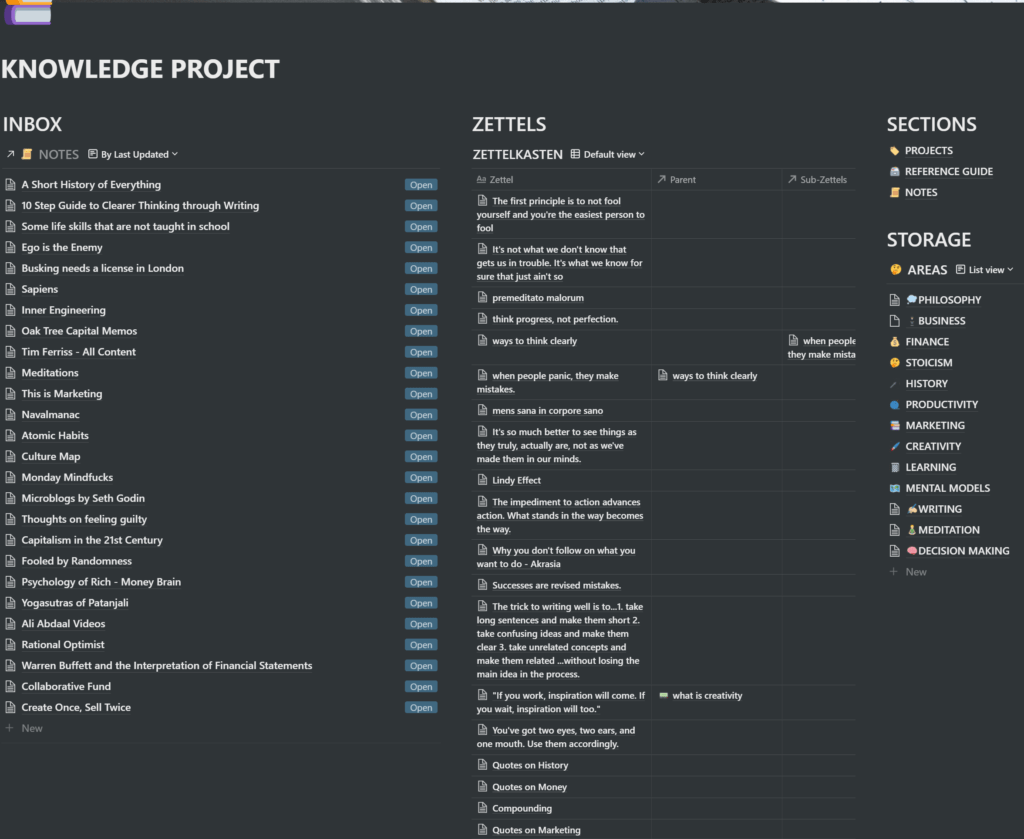
- Notes should be of different types, serving different purposes.
- Fleeting notes are thoughts that just occur naturally and you can capture. These creative ideas, something you heard, recommendation or so on.
- Literature notes are lessons from books, articles, podcasts, videos, and so on. These are copious notes that you take while consuming the information. Don’t be lazy, write or highlight (if you’re reading on Kindle), or bookmark everything down!
- Permanent notes are just the most important notes from the literature notes and fleeting notes in your own words. So if you highlighted 20 things in a book, you will create permanent notes on the most important 7 ideas (for example). These notes are written after some time of documenting your literature notes. This allows you to marinate your thoughts plus revise whatever you have read. I usually give them a week. These are your zettels.
- You need to find ways to connect literature notes and permanent notes and additionally (most importantly) permanent notes with each other. That’s how you can generate ideas!
Yes – sounds like a lot of work. But again, you’re developing a system. It takes time.
I NEED MORE DETAILS
I recently got interested in the Zettelkasten system and this book lays out the idea of note-taking brilliantly.
Ali Abdal on creating a second brain
Video explaining Zettelkasten
🤔 THINKING
CASE
Do you actually get time to think? I am not talking about mindlessly doing a task. I am talking about thinking in terms of ideas, lessons, philosophy, and hobbies. What’s the purpose of life? The meaning of your existence? How are you living your life? The way you are living it, is it really the way you want to live? That kind of deep question might put a few people to sleep.
I am no expert at this. But essentially, now that you have read, written, created notes, built a second brain, and organized your thoughts, comes the interesting part – you connect all this and generate ideas. Think. Ponder.
You will get time to think based on the ideas you have consumed, reflect on your own self and other people’s thoughts, and meditate.
It will give you time to develop your own mental models and find biases. You will develop life principles. Document them. This will help you understand the world better. Understand yourself better.
Write these ideas down. Share them. Or don’t. But it will 100% help you better navigate the world.
Note: Some items listed above are Amazon affiliate links. This means I receive a very small commission if you make a purchase after clicking through some of the images/links above, at no additional cost to you (i.e. the prices don’t change).

